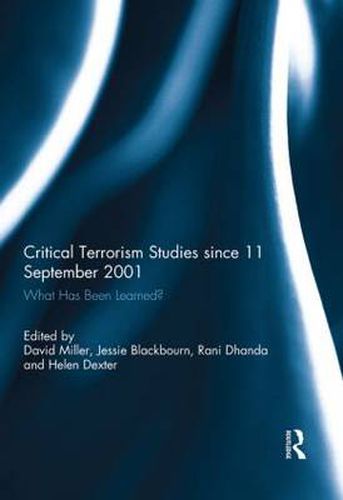Readings Newsletter
Become a Readings Member to make your shopping experience even easier.
Sign in or sign up for free!
You’re not far away from qualifying for FREE standard shipping within Australia
You’ve qualified for FREE standard shipping within Australia
The cart is loading…






Academic studies of ‘terrorism’ grew exponentially in number after the September 11 attacks. The problem was that much of this work of ‘orthodox’ terrorism studies was biased, often shoddily researched and was too closely identified with the power centres of Western states. Its denizens were often former and sometimes current officials or officers in the military, intelligence services or the security industry or were funded by them.
In response the project of Critical Terrorism Studies was intended to give a more rounded account of political violence in the world. It focuses on neglected issues like state terrorism, Western counterinsurgency, propaganda and misinformation.
More than a decade since the founding of the critical project, this book asks what has been learned. It showcases leading examples of critical terrorism studies and presents an agenda for the expansion of an evidence-based approach to political violence and terrorism.
With chapters by leading authorities such as Joseba Zulaika, Michael Stohl, Mary Hickman and Richard Jackson, the book evaluates how far the critical project has come and where it is going next.
This book was published as a special issue of Critical Studies on Terrorism.
$9.00 standard shipping within Australia
FREE standard shipping within Australia for orders over $100.00
Express & International shipping calculated at checkout
Academic studies of ‘terrorism’ grew exponentially in number after the September 11 attacks. The problem was that much of this work of ‘orthodox’ terrorism studies was biased, often shoddily researched and was too closely identified with the power centres of Western states. Its denizens were often former and sometimes current officials or officers in the military, intelligence services or the security industry or were funded by them.
In response the project of Critical Terrorism Studies was intended to give a more rounded account of political violence in the world. It focuses on neglected issues like state terrorism, Western counterinsurgency, propaganda and misinformation.
More than a decade since the founding of the critical project, this book asks what has been learned. It showcases leading examples of critical terrorism studies and presents an agenda for the expansion of an evidence-based approach to political violence and terrorism.
With chapters by leading authorities such as Joseba Zulaika, Michael Stohl, Mary Hickman and Richard Jackson, the book evaluates how far the critical project has come and where it is going next.
This book was published as a special issue of Critical Studies on Terrorism.